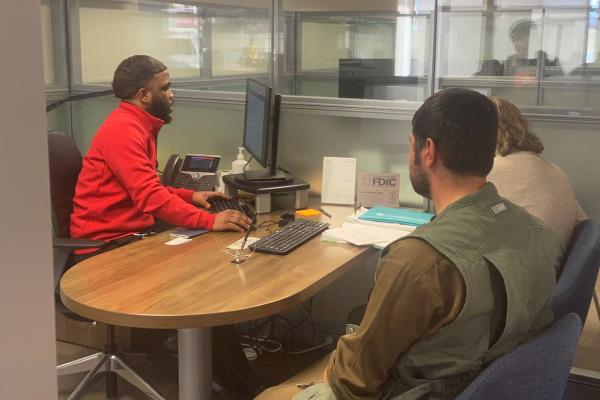
Catholic Charities of Arkansas’s Refugee Resettlement Office has a new status and new challenges that come with it.
On Jan. 1, the office transitioned from a community partner to an affiliate office with the United States Conference of Catholic Bishops’ Migration and Refugee Services. With the new status came a much larger caseload of clients to help.
From 2015 to 2019, the Refugee Resettlement Office received no new clients. After successfully assisting 108 Afghan refugees following the fall of the Afghanistan government to the Taliban Aug. 15, 2021, the Refugee Resettlement Office is expected to help as many as 75 individuals in 2024.
“To have 75 is more than we’ve ever done before,” said Refugee Resettlement Office director Jennifer Verkamp-Ruthven. “I’ve been involved in the refugee resettlement program now for about three or four years, and I’ve never seen it. My predecessor as well never experienced resettling that many people, so it’s a drastic change.”
The increase is a result of President Joe Biden’s decision to increase the annual admissions cap for refugees from 15,000 to 62,500. While in 2021-2023, the Refugee Resettlement Office became synonymous with working with Afghan refugees, Verkamp-Ruthven expects to see refugees from all over the world this year.
“We’ve had some Syrians, people from Central America, like El Salvador and Guatemala,” she said. “We’re expecting people from Venezuela and Nicaragua. We have gotten more Afghans, but we’re seeing more from Central and South America.”
Verkamp-Ruthven said the language barrier will be easier to navigate for the influx of Spanish-speaking refugees, but many challenges still remain.
Malleson Emmerling, a refugee resettlement case manager, said the clock starts ticking the moment a refugee arrives in the country, even if they haven’t reached Arkansas or the Refugee Resettlement Office yet.
“This settlement period is only 90 days,” Emmerling said. “On day 90, we sign off on the case, and our services are finished.”
This means the Refugee Resettlement Office has 90 days to put refugees in the best position possible to thrive, teaching them basic English, finding employment and a place to live and positioning them to pay their own bills. Refugees are also enrolled into government health insurance and the Supplemental Nutrition Assistance Program (SNAP).
“We get them social security cards, Medicaid cards, photo IDs and documentation,” Emmerling said.
The USCCB provides the Refugee Resettlement Office with a checklist of items to provide for newly settled refugees to ease the transition from one country to another. This, Verkamp-Ruthven said, is where the Refugee Resettlement Office could use some help from the community.
The Refugee Resettlement Office is taking donations of households supplies, such as kitchen utensils and dishes, bathroom toiletries, bedding, cleaning supplies, diapers and technology to accommodate a larger caseload this year.
Claire Hollenbeck, a student at the Clinton School of Public Service, is completing her capstone project for her master’s degree with the Refugee Resettlement Office.
“I've been working to create resources and come up with recommendations and ideas, like tangible products that could be used to increase capacity and efficiency,” Hollenbeck said. “With getting so many more cases, it is so important that we're able to help each case and keep working the way we do, having the full amount of dignity and respect and being Christ-like to those we serve.”
Before becoming an affiliate office, refugees received through the Refugee Resettlement Office had to have U.S. ties. Now, they do not. Verkamp-Ruthven said the refugees received through the USCCB’s Migration and Refugee Services have had background checks before they move to Arkansas, so the misconception that refugees are dangerous are false.
“On average, someone is displaced for 17 years, and if they happen to be chosen to be resettled in the United States, typically it’s because they have a U.S. tie,” she said. “Then it takes, on average, about 18 to 24 months to process, and they have to go through multiple screenings. So we have one of the most secure refugee admitting processes in the world.”
For Verkamp-Ruthven and others at the Refugee Resettlement Office, being the hands and feet of Christ is pivotal to navigating the new challenges that will come with a larger caseload.
“It’s important to remember that this is a ministry of the Church,” Verkamp-Ruthven said. “When we serve, we should always keep at the forefront of our minds that when we're welcoming the stranger or serving this person, we're really serving Jesus.”
Please read our Comments Policy before posting.
Article comments powered by Disqus Resettlement program seeking housing for new refugees
Resettlement program seeking housing for new refugees
 Afghan refugee aids refugees at Catholic Charities
Afghan refugee aids refugees at Catholic Charities
 U.S. bishop hails government’s refugee plan for 2024
U.S. bishop hails government’s refugee plan for 2024
 Scholarships lead to nurses and lawyers for Guatemala
Scholarships lead to nurses and lawyers for Guatemala
 Don’t let misconceptions cause faith to waver
Don’t let misconceptions cause faith to waver
 Seniors, whatever storms may come, Jesus will be there
Seniors, whatever storms may come, Jesus will be there
 Studio 3:16 offers new approach to teaching religion
Studio 3:16 offers new approach to teaching religion
 After three decades, NLR principal plans to retire
After three decades, NLR principal plans to retire
 CHS athlete overcomes odds to reach collegiate goal
CHS athlete overcomes odds to reach collegiate goal
 St. Joseph a model of solidarity with immigrants
St. Joseph a model of solidarity with immigrants
 Two gifts after Jesus’ death: Virgin Mary and Eucharist
Two gifts after Jesus’ death: Virgin Mary and Eucharist
 Why we have an altar, and not just a communion table
Why we have an altar, and not just a communion table
 Pope: Wars should be resolved through nonviolence
Pope: Wars should be resolved through nonviolence
 Living relationship with Jesus Christ in the Eucharist
Living relationship with Jesus Christ in the Eucharist